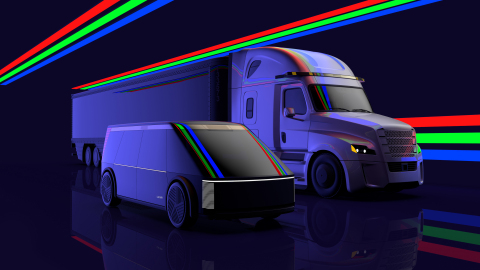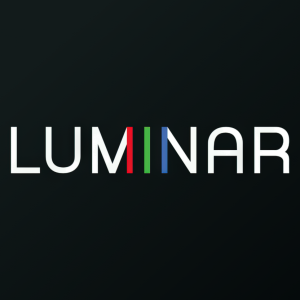Luminar Debuts Blade, a Design Vision for Our Autonomous Future
Luminar Technologies (Nasdaq: LAZR) launched its Blade concept at its first Studio Day in New York City, revealing a vision for the integration of autonomous technology in vehicles, including robo-taxis and trucks. The press event highlighted the Iris lidar system, set for series production with OEM partners by late 2022. Blade exemplifies a new vehicle architecture, merging design and functionality to enhance safety and autonomy in the automotive sector. Luminar aims to lead the market with its innovative approaches and partnerships with industry leaders like Volvo and Daimler.
- Introduction of the Blade concept represents a major advancement in autonomous vehicle design.
- The Iris lidar system is poised for series production with OEM partners by late 2022.
- Partnerships with major automakers like Volvo and Daimler enhance market credibility.
- Potential delays in production and integration could hinder market entry.
- Dependence on partnerships for successful technology adoption may pose risks.
Insights
Analyzing...
Today, at its inaugural Studio Day in New York City, Luminar Technologies, Inc (Nasdaq: LAZR) introduced Blade, its vision for the future of design and integration of autonomous technology across robo-taxis, trucking and consumer cars. Luminar also showcased the first consumer vehicle fully integrated with Luminar’s Iris lidar, which is on-track for series production with Luminar’s OEM partners, starting in late 2022. The company is kicking off a global customer roadshow this week to demonstrate the performance, capabilities, and design integration of Iris.

(Graphic: Business Wire)
“Luminar is making the transition from the leader in lidar to the leader in automotive autonomy and safety. Historically autonomous vehicle companies have been exclusively focused on robo-taxis, but our focus has been building the technology foundation for autonomy starting with consumer vehicles and moving across verticals including trucks and robo-taxis,” said Austin Russell, Founder and CEO of Luminar. “Ultimately, it takes more than just great technology to deliver great design, and that’s exactly why we’re proud to show off the Blade concept with Iris that goes beyond the cars of today and visualizes the robo-taxis and trucks of tomorrow.”
Blade: The Autonomous Design Imperative
When it comes to automotive, harmony of form, function and technology is a paramount ideal for consumers and car makers. Blade is a first-ever concept and a powerful design expression of autonomous technology seamlessly integrated into cars, trucks and robo-taxis. It creates a foundation for a new vehicle architecture that automakers can incorporate into vehicle development programs from the onset. The Blade concepts unveiled today for robo-taxi and trucking represent a creative collaboration between Luminar and NewDealDesign, led by acclaimed technology designer Gadi Amit.
“To create the best car design and user experience, autonomous technology must be engineered and designed hand-in-hand from the ground up,” said Jason Wojack, Senior Vice President of Product Development at Luminar who honed his design-meets-engineering sensibility as the chief architect of the Motorola Droid RAZR, which revolutionized the slimness of phones. “Focusing on form and function at not just the lidar-level but the vehicle-level has enabled Luminar to spearhead the design integration of autonomous technology, which is among the fastest design breakthroughs in automotive history.”
Luminar’s Iris is the first autonomous technology designed to marry form and function: it combines performance, auto-grade robustness, scalability, and automotive aesthetic seamlessly. Iris was designed from the beginning to be cleanly integrated into the vehicle roofline, displacing the roof-rack style conglomerates historically seen on autonomous development vehicles and leapfrogging bolt-on products in development.
“Many technology companies under-appreciate the importance of design in envisioning fundamental technology architecture, especially when it comes to automotive. Luminar has redefined AV design with seamless consumer vehicle integration, and is taking it to the next level with the Blade concept,” said Amit. “We hope that Blade can become the manifestation of blending lidar, autonomy, and next-generation vehicle design in an optimized and iconic way.”
Luminar unveiled two Blade blueprints, which speak to the unique design and use case requirements for robo-taxi and trucking. Both concepts integrate the sensing technology into the roofline of the vehicle, creating an autonomous “blade.”
Luminar’s Blade Robo-taxi design imagines:
- A sleek, roomy and inspiring car design for autonomous operation on highways and urban environments
- Located for best performance, the golden ‘Blade’ runs across the crown of the vehicle, incorporating 4 Luminar lidars for 360-degree coverage
- Built for consumers as well as ridesharing operations as lines between applications blur
Luminar’s Blade trucking design imagines:
- A compact and seamless autonomous design integration
- A three-lidar configuration for long-range sensing in all directions
- Capability to retrofit onto existing class 8 trucks
Luminar remains focused on being the autonomous technology provider to the automotive industry. The new Blade designs give Luminar partners a reference for incorporating Luminar’s technology into their future vehicles and demonstrates the company’s commitment to not only delivering leading-edge technology but also beautiful design integration.
To view a replay of today’s webcast, please visit www.luminartech.com/studioday; and follow the Iris roadshow on Twitter @luminartech.
About Luminar Technologies:
Luminar is an autonomous vehicle sensor and software company with the vision to make autonomy safe and ubiquitous by delivering the only lidar and associated software that meets the industry’s stringent performance, safety, and economic requirements. Luminar has rapidly gained over 50 industry partners, including 8 of the top 10 global automotive OEMs. In 2020, Luminar signed the industry’s first production deal for autonomous consumer vehicles with Volvo Cars, while also recently striking deals with Daimler Truck AG and Intel’s Mobileye. Luminar has also received minority investments from the world’s largest commercial vehicle manufacturer, Daimler Truck AG, and Volvo Cars, a global leader in automotive safety, to accelerate the introduction of autonomous trucks and cars at highway speed. Founded in 2012, Luminar is a 400-person team with offices in Palo Alto, Orlando, Colorado Springs, Detroit, and Munich. For more information please visit www.luminartech.com.
Forward-Looking Statements
Certain statements included in this press release that are not historical facts are forward-looking statements for purposes of the safe harbor provisions under the Private Securities Litigation Reform Act of 1995. Forward-looking statements generally are accompanied by words such as “believe,” “may,” “will,” “estimate,” “set,” “continue,” “towards,” “anticipate,” “intend,” “expect,” “imagines,” “should,” “would,” “plan,” “predict,” “potential,” “seem,” “seek,” “future,” “forward,” “ahead,” “outlook,” and similar expressions that predict or indicate future events or trends or that are not statements of historical matters. These forward-looking statements include, but are not limited to, statements regarding progress towards series production of the first consumer vehicle fully integrated with Luminar’s Iris lidar and beginning in 2022, including Volvo Cars, SAIC, Daimler Trucks North America and Pony.ai, Luminar’s transition to becoming the leader in automotive autonomy and safety, statements regarding the Blade blueprints and what they imagine, and the prospect of Luminar partners incorporating Luminar’s technology into their future vehicles. These statements are based on various assumptions, whether or not identified in this press release, and on the current expectations of Luminar's management and are not predictions of actual performance. Forward-looking statements are subject to a number of risks and uncertainties that could cause actual results to differ materially from the forward-looking statements, including but not limited to Luminar’s financial condition, Luminar’s limited operating history; Luminar’s inability to reduce and control the cost of the inputs on which Luminar relies; Luminar’s ability to transition to an outsourced manufacturing business model; the success of Luminar’s customers in developing and commercializing products using Luminar’s solutions; Luminar’s ability to expand operations in China; Luminar’s ability to protect its intellectual property rights; whether Luminar’s lidar products are selected for inclusion in autonomous driving or ADAS systems by automotive OEMs or their suppliers; changes in personnel and availability of qualified personnel; the amount and timing of future sales; the extent to which customers who have selected Luminar for a program win commercially launch vehicles which include Luminar hardware and software products, including their success in integration and volume and timing of such launch, and whether such launches are successful unrelated to Luminar’s technology; the extent to which delays in commercial launch or testing and development are delayed because of regulation; customer cancellation of contracts; whether the complexity of Luminar’s products results in undetected defects and reliability issues which could reduce market adoption of its new products, damage its reputation and expose Luminar to product liability and other claims; strict government regulation that is subject to amendment, repeal or new interpretation and Luminar’s ability to comply with modified or new laws and regulations applying to its business; general economic uncertainty and the effect of general economic conditions on Luminar’s industry in particular, including the level of demand and financial performance of the autonomous vehicle industry and market adoption of lidar; and the other risks discussed under the heading “Risk Factors” in the Annual Report on Form 10-K filed by Luminar on April 14, 2021, the registration statement on Form S-1 (No. 333-251657) filed with the SEC and amendments thereto (including the post-effective amendment filed with the SEC on May 21, 2021), and other documents Luminar files with the SEC in the future. If any of these risks materialize or our assumptions prove incorrect, actual results could differ materially from the results implied by these forward-looking statements. You are cautioned not to place undue reliance upon any forward-looking statements, which speak only as of the date made and Luminar undertakes no obligation to update any forward-looking statement to reflect events or circumstances after the date of this press release.
View source version on businesswire.com: https://www.businesswire.com/news/home/20210615005773/en/







